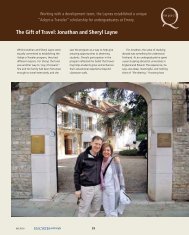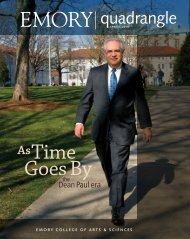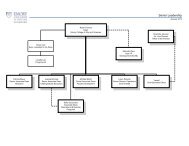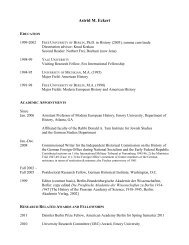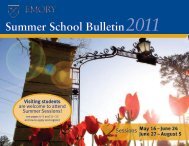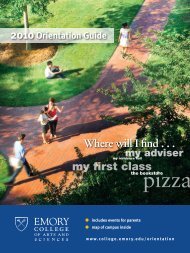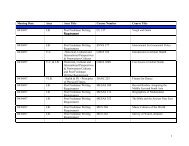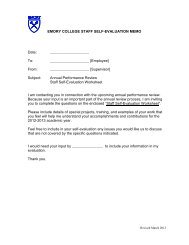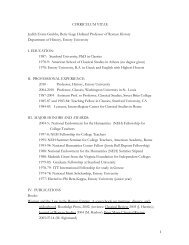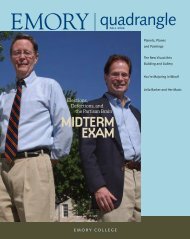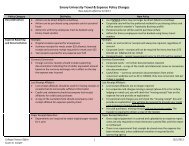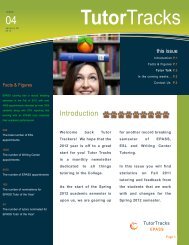2012 Summer School Bulletin - Emory College - Emory University
2012 Summer School Bulletin - Emory College - Emory University
2012 Summer School Bulletin - Emory College - Emory University
You also want an ePaper? Increase the reach of your titles
YUMPU automatically turns print PDFs into web optimized ePapers that Google loves.
We will first learn how to find ideas for stories, and then we will work on developing<br />
those ideas into stories by merging the specific elements of fiction: characterization,<br />
setting, point of view, dialogue, and plot. The workshop will require students to critique<br />
each other and, in turn, to understand the revision process. Students will write several<br />
scenes, two short stories, and revisions of those stories. Additionally, students will keep<br />
a notebook in which they will practice writing techniques as assigned. Students should<br />
budget for photocopying.<br />
Dance<br />
229-00C. INTRODUCTION TO DANCE<br />
11:30 a .m .–12:50 p .m . Daily . 2nd session . Credit, 4 hrs . Radell<br />
Introduction to Dance is an overview of dance as an expressive art form, a symbolic<br />
language, and an integral aspect of world cultures. The course is designed to help students<br />
grasp a range of cultural, aesthetic, and bodily worlds from which dance is born. Course<br />
work enables students to develop intuitive and verbal skills that allow them to articulate<br />
movement and its meaning. This is supported by direct physical experience in various<br />
dance forms, styles, genres, and thoroughly exploring the creative process.<br />
Economics<br />
PRINCIPLES OF MICROECONOMICS<br />
101-00A. 10:00–11:20 a .m . Daily . 1st session . Credit, 4 hrs . Streeb<br />
101-00C. 1:00–2:20 p .m . Daily . 2nd session . Credit, 4 hrs . Jiang<br />
In this course, we learn the basic concepts and methods of microeconomics—the study<br />
of how individual consumers and producers make their decisions and interact in markets<br />
under conditions of perfect and imperfect competition. We also apply these concepts and<br />
methods to a range of economic questions and policy issues. One important set of policy<br />
Course Number Key and Dates<br />
00A: First session May 21 – June 29 00F: Miscellaneous Varies<br />
00B: Entire summer May 21 – August 10 0PA, 0PB, 0PC Permission required<br />
00C: Second Session July 2 – August 10<br />
MAY: Maymester May 15–June 1<br />
issues is whether and how markets may fail and whether, when they fail, government<br />
intervention may be needed to correct those failures. Topics covered include demand and<br />
supply in competitive markets, market power, game theory, information economics, and<br />
externalities and public goods.<br />
112-00C. PRINCIPLES OF MACROECONOMICS<br />
10:00–11:20 a .m . Daily . 2nd session . Credit, 4 hrs . Wemy<br />
Prerequisite: Economics 101. This course studies the workings of the aggregate economy<br />
and the factors that determine levels of unemployment, inflation and economic growth.<br />
Among the topics covered are fiscal policies and budget deficits; the banking system, the<br />
money supply, and monetary policy and the Federal Reserve system. Current economic<br />
issues are emphasized.<br />
INTERMEDIATE MICROECONOMICS<br />
201-00A. 1:00–2:20 p .m . Daily . 1st session, Credit, 4 hrs . Kiebzak<br />
201-00C. 1:00–2:20 p .m . Daily . 2nd session, Credit, 4 hrs . Maddox<br />
Prerequisites: Mathematics 111 or Mathematics 119 and Economics 101. In this course we<br />
study the economic decisions of consumers and firms, both individually and as participants<br />
in markets. Our goal is to develop a theory that explains why people do what they do.<br />
Along the way we compare markets with other ways of organizing economic activity.<br />
The course covers both classic microeconomic theory and topics such as the economics of<br />
information and game theory.<br />
INTERMEDIATE MACROECONOMICS<br />
212-00A. 1:00–2:20 p .m . Daily . 1st session, Credit, 4 hrs . Peng<br />
212-00C. 11:30 a .m .–12:50 p .m . Daily . 2nd session, Credit, 4 hrs . Maddox<br />
Prerequisites: Mathematics 111 or Mathematics 119; Economics 101 and Economics 112.<br />
This is an intermediate-level course in which we will use basic calculus to learn several<br />
different models (in detail) for different macro questions. The main objective of this course<br />
is to help you to understand and explain in economics terms the main macroeconomic<br />
issues discussed in media outlets such as CNN, CNBC, the Wall Street Journal, Newsweek,<br />
etc. Another objective is to prepare students for upper-level macro courses. Students are<br />
expected to know some basic macro principles and basic calculus from prior courses. The<br />
following questions will be answered in this course: Why did the recent global financial<br />
<strong>Summer</strong> <strong>School</strong> <strong>Bulletin</strong> Courses | 19 www.college.emory.edu/summer



